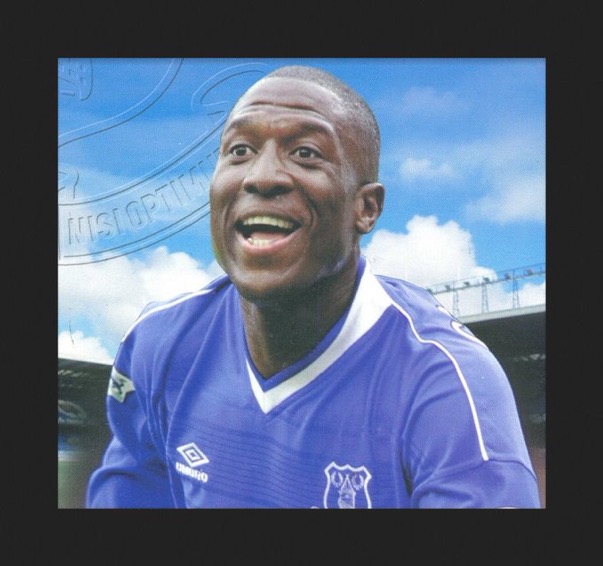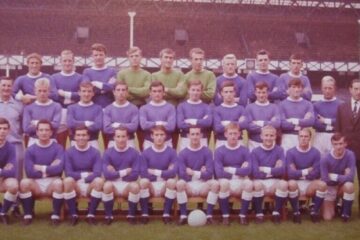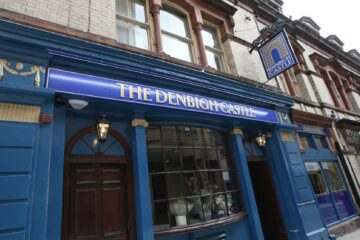Rob Sawyer
Sometimes, fate throws a football club and player together in times of mutual adversity and it just clicks. Witness Howard Kendall’s 1983 roll of the dice with Andy Gray, a player whose salad days were thought to be long behind him. So it was, also, when Kevin Campbell rolled up at L4 in 1999.
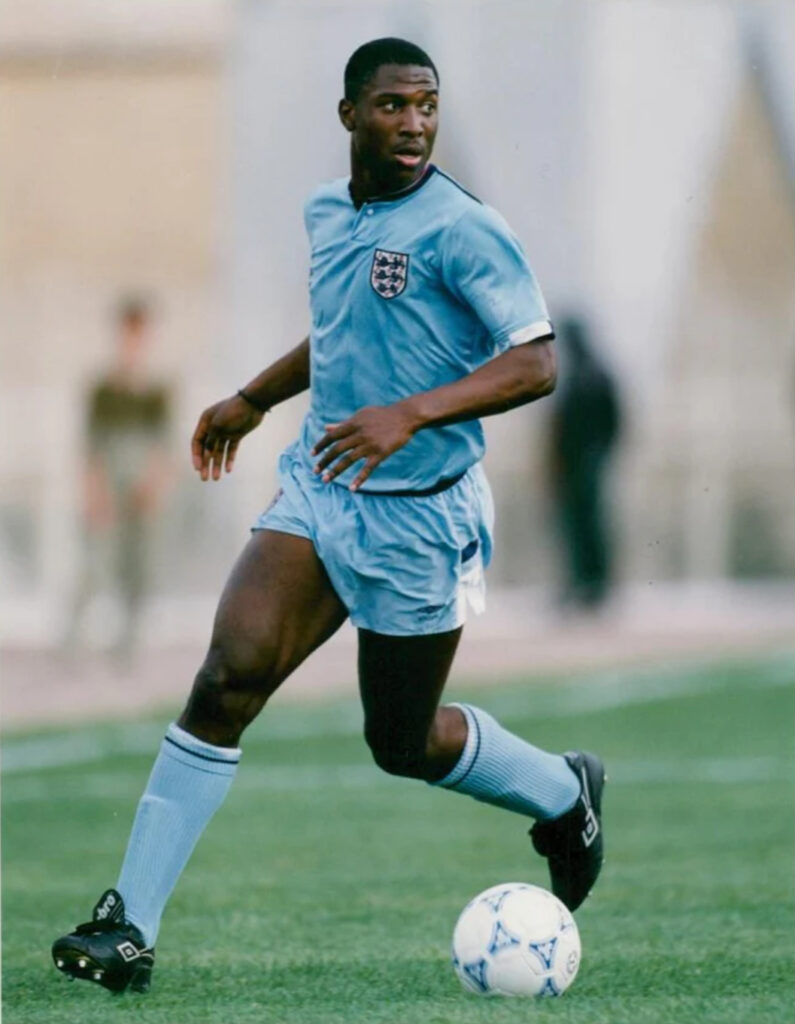
Campbell, born in February 1970, came through the ranks at Arsenal in his native London, having loan spells at Leyton Orient and Leicester City to aid his development. His first team debut came against Nottingham Forest in 1988, and he had been part of the squad which had won silverware under George Graham. Without ever quite being assured of his place in the side (competition was fierce, with the likes of Alan Smith, Paul Merson and Ian Wright in the mix, over the years), Campbell scored 59 times for the Gunners. In 1995, he left Highbury to further his career. First stop was the City Ground, Nottingham. He would be at Forest for three seasons, linking with Pierre Van Hooijdonk and contributing 40 goals in 96 appearances before seeking a fresh challenge.
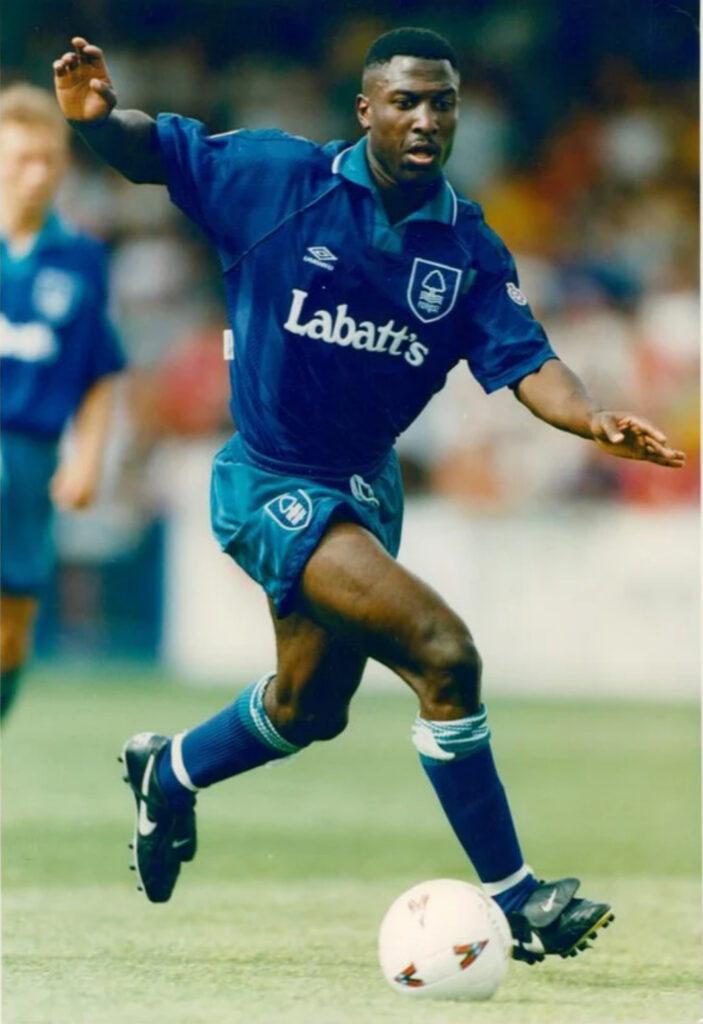
The move to Turkish side Trabzonspor turned sour with a club official quoted as using a racist slur to describe the Londoner. A deadline day loan move to Everton on 25 March 1999, was in the interest of all parties. For Campbell, it got him away from a toxic situation, for the Blues it brought in an experienced head and much-needed firepower to help in another relegation battle. Walter Smith’s big money buy, Ibrahima Bakayoko, had failed to settle into English football, while talismanic number nine Duncan Ferguson had been sold to help fill some of the hole in the Blues’ finances.
Claiming to be ‘feeling sharp’, in spite of being banished from training with the first team in Trabzon, the new arrival told the Liverpool Echo: ‘I hope I can provide a little spark for the rest of the team. I know the supporters are fantastic…and if they get behind the team for the last eight games then I think we can stay up. I can help ease the goalscoring problems they have had here.’
He was true to his word.
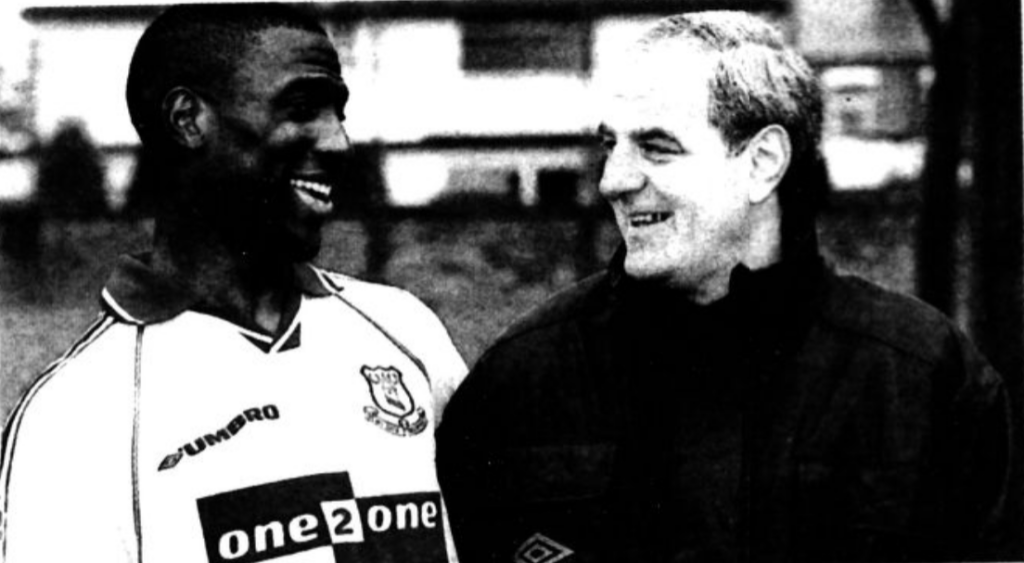
The club’s supporters were crying out for a hero, but had little expectation of what Campbell might deliver. Along with fellow ex-Forest player Scot Gemmill, Campbell debuted for his new club in an away defeat to Liverpool. In his third outing in blue, he kicked into gear. In a match also remembered for Marco Materazzi sobbing on the touchline after being red carded (effectively signaling the end of his Everton career), Campbell bagged two goals at the Gwladys Street end to secure an invaluable win over Coventry City. It marked the beginning of a remarkable scoring run, in which he, almost single-handedly, inspired the Toffees to lift themselves away from the drop zone. He grabbed a second successive brace in a 3-1 win at St James’s Park, and followed it up with two more when Charlton Athletic were dispatched 4-1 at Goodison, which effectively secured top-fight safety. In the final home match of the season, he went one better, netting a hattrick as a revitalized Everton walloped West Ham United 4-1.
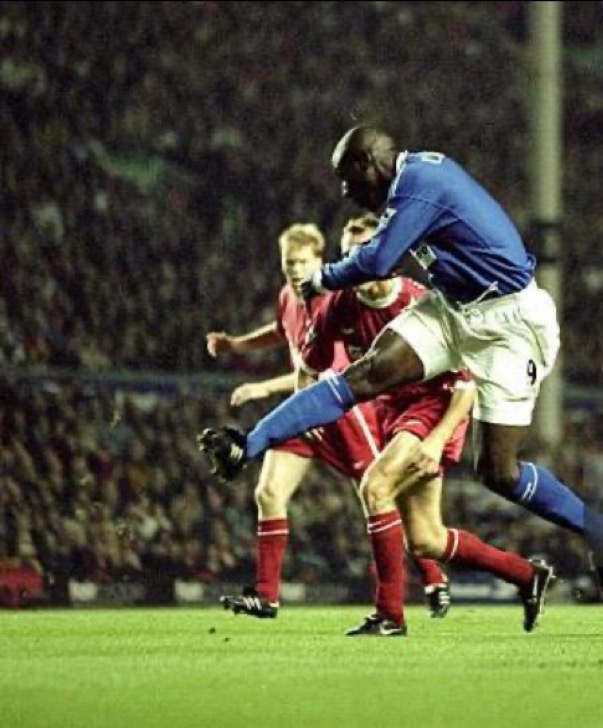
It wasn’t just clinical finishing that the striker brought to the Everton team; he was an all-round striker with height and heft to hold the ball up, and was no slouch pace-wise. Moreover, there was his infectious sense of positivity as well as the experience and know-how required to bring the best out of fast-developing strike partner Franny Jeffers. With the cash-strapped Merseysiders unable to get a deal over the line with Trabzonspor, the man dubbed ‘Super Kev’ by Blues supporters had to train alone during pre-season for 1999/00, but, in mid-July a £3 million transfer agreed. He picked up where he had left off, with the Jeffers-Campbell partnership continuing to flourish. He would score the winner at the Kop end in September, the start of a purple patch of goals which took him into the autumn, with the Toffees sitting pretty in the top ten. Increasingly troubled by a knee condition, he was less productive in front of goal in the new year, so a decision was made in early March to have surgery performed.

In the close season, the club had brought Duncan Ferguson back from Newcastle United. Shortly after his return, Kevin welcomed the competition for places that the Scot would bring, but was clear on one thing when interviewed for the matchday programme: ‘The number nine jersey is mine,’ he declared. ‘Losing that number would probably be the only time you would find me knocking on the manager’s door. Unfortunately for Ferguson, he suffered an injury soon after arrival, and Campbell rushed back to fill the void, coming on as a substitute at the Riverside in early September. He would later confess to having come back too soon in his recovery process, and he struggled to get back to the levels he had been at a year previously. It would be a disappointing season for the club, ending in a 16th place finish, with Kevin scoring 12 times in 33 appearances. One bright spot was the striker becoming the first person of colour to captain the Toffees – in doing so, he led the side to a much-needed away win at Coventry on 20 January 2001.
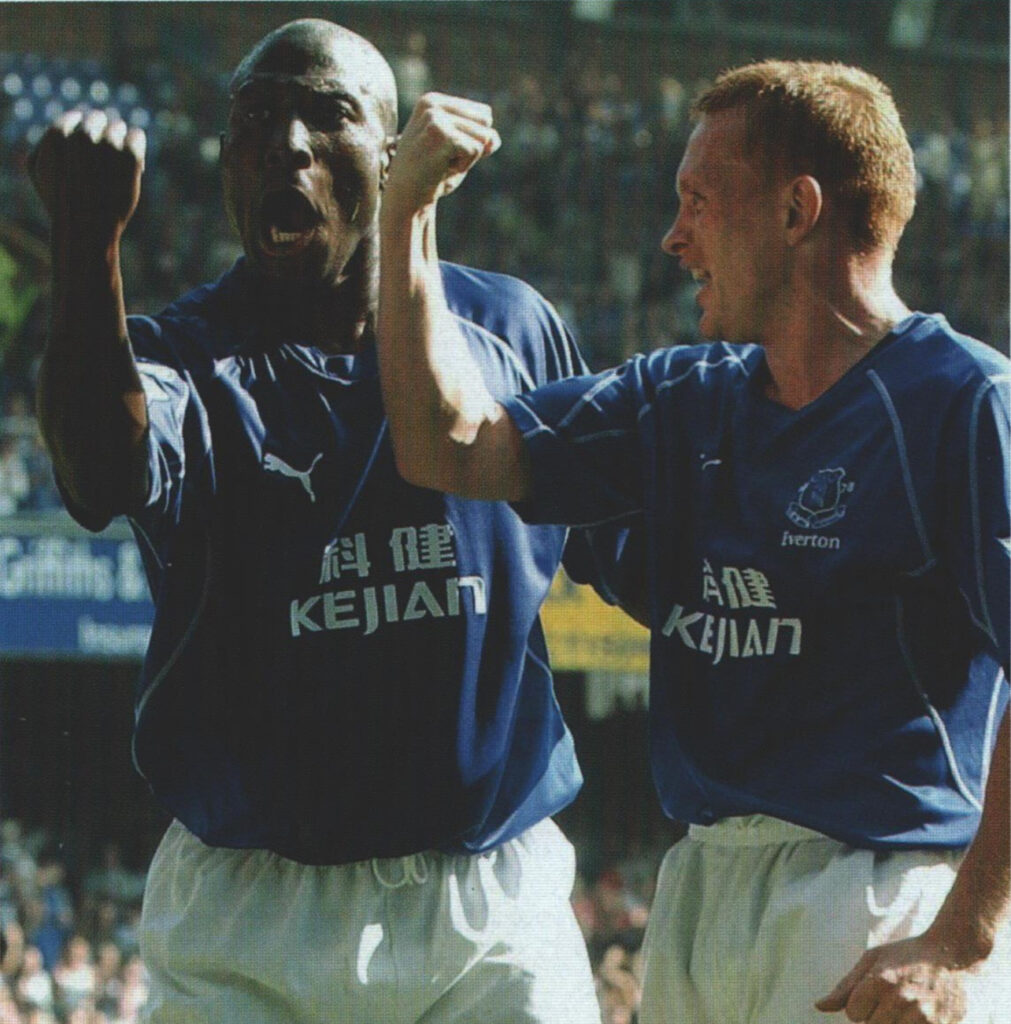
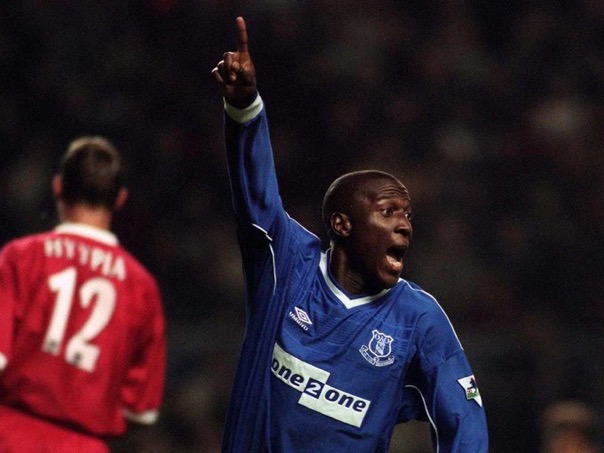
He would find himself vying for a place in the forward line with Duncan Ferguson and Tomasz Radzinski as the club’s struggles continued in the following season, and Walter Smith was replaced as manager by David Moyes in March 2002. Come the start of the 2002/03 campaign, Campbell found himself paired in attack with the teenage prodigy Wayne Rooney; the blend of youth and experience worked extremely well. The rejuvenated number nine was back in the goals and played a large part in a seventh-place finish.
Now into his early thirties, Campbell, who had been rewarded with a long-term contract, got very limited gametime in Moyes’ second full season in charge – his only goal coming when brought on as substitute in a last day mauling by Manchester City. However, he started the 2004/05 season as the number nine, before Moyes opted for Marcus Bent, a fast, athletic forward who better suited the 4-5-1 formation. When he did find himself relegated to warming the bench in the latter part of his time at Everton, he remained the ultimate professional: ‘I will have to sit tight and be patient and wait for my chance. Kevin Campbell does not have a divine right to be in the first team. The most important thing is Everton Football Club.’
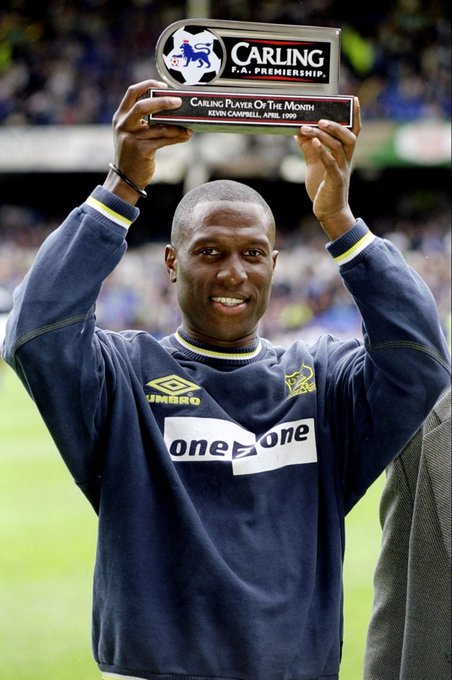
Campbell’s Everton farewell came on 4 January 2005, a match which saw Leon Osman score a dramatic late winner, as the Toffees continued their challenge for a Champions League place. By the time it was secured, Campbell had moved on to the West Midlands. He would prove to be far from finished as a player, making 16 league appearances and inspiring West Bromwich Albion to an improbable escape act after looking dead and buried at the mid-point of the season. After a further season at the Hawthorns, he wrapped up his playing career in 2007 at Championship side Cardiff City.
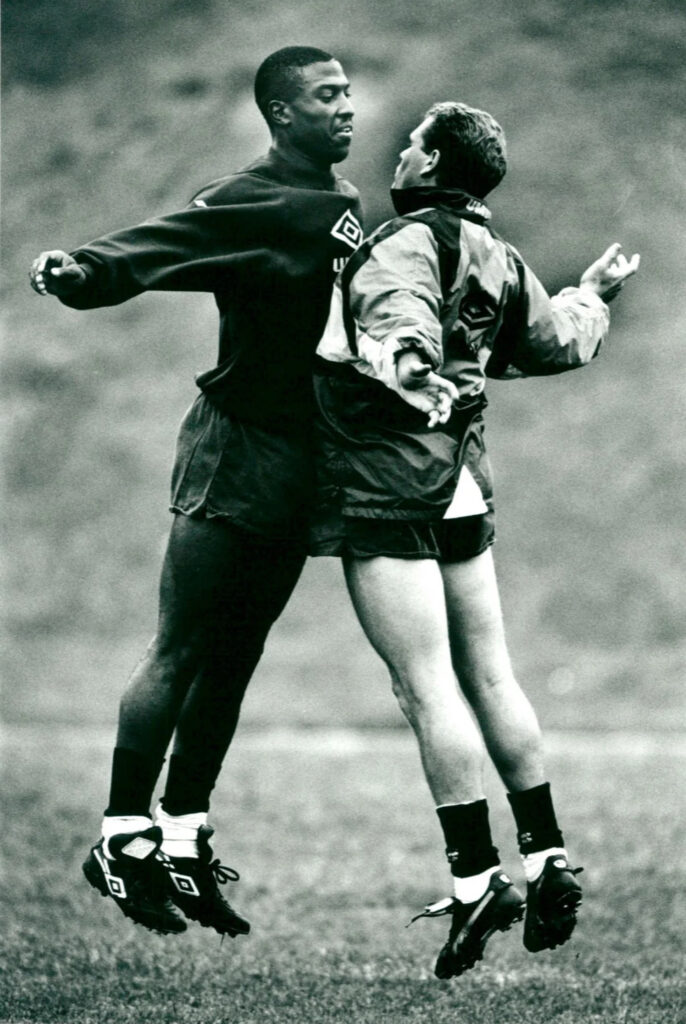
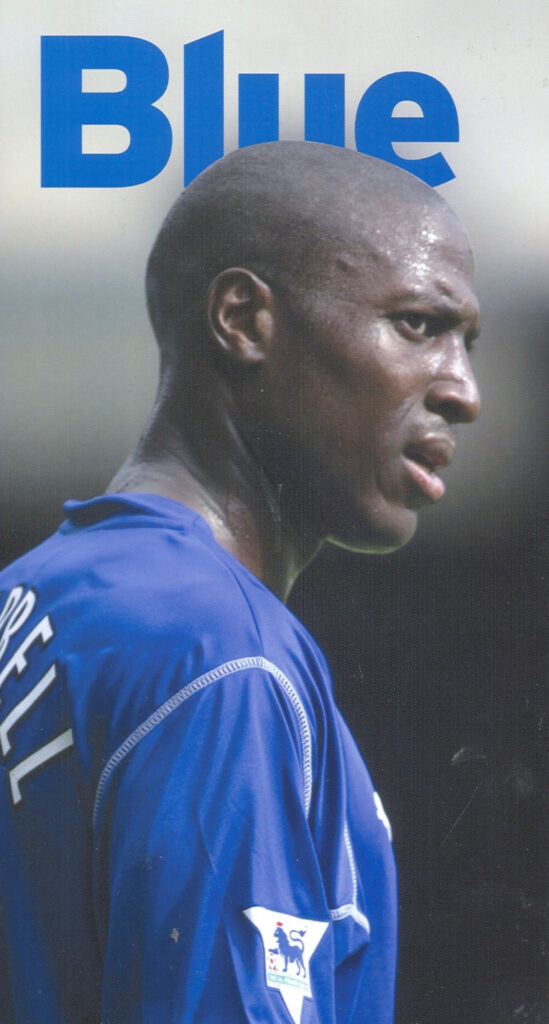
Post-playing, Kevin would be involved in several business ventures and had the pleasure of mentoring his son Tyrese, who plays for Stoke City, after being with Manchester City’s academy.
He never stopped loving Everton – the feeling was reciprocated by supporters. Whether it was on social media or when appearing on TV, he rarely missed an opportunity to big up the Toffees. It’s a hackneyed phrase, but Kevin Campbell really did ‘get Everton’. He was a willing participant at many social events linked to the club – including the third Gwladys Street Hall of Fame dinner in 2001, held at the Adelphi (he was inducted in 2017). There he would meet a starstruck nine-year-old mascot for the night, Lewis Royden – now a member of Everton FC Heritage Society, alongside his father, Mike.
Lewis said on hearing the news, ‘I’m absolutely heartbroken. I was seven years old when my favourite player buried the reds at Anfield, and I have loved him ever since. A truly wonderful man that will be so dearly missed by all. It was an honour to meet Super Kev, and I still have the pictures on my wall.’

More recently, Kevin would often stroll down Goodison Road on matchdays and happily pose for selfies and give autographs – always with that winning smile and a kind word for everyone.
Although word of his failing health had been in the public domain, the death of Kevin Campbell came as a huge blow to those who admired him as a footballer and man. The outpouring of emotion and countless anecdotes shared which testified to the man’s huge heart, were telling. For Goodison Park denizens, he was, and always will be, Super Kev, a proper Everton number nine whose charisma and priceless goals scattered the dark clouds in 1999.
Tony Wainwright of Everton FC Heritage Society said, ‘We had a brilliant night with him a few years ago. It was at a function in Orry’s above the pub. About 60 people in total. He came round tables, spoke about his love for the Blues – the club and the fans. The end of the night was special, he was sat on our table and somebody started singing “who put the ball in the red side’s net”. To see him singing along at the top of his voice is a memory that me and my son Joe will treasure.
Jamie Yates, also of EFCHS, remembered, ‘When I was a kid growing up in Hertfordshire, a schoolmate of mine was a massive Gooner. Kev was mates with the guy who ran the corner shop at the end of his road. He’d go down for his Shoot! and Match magazines and some sweets, and Kev would be serving behind the till! I was at a night at the Winslow a few years ago, and asked Kev if he remembered helping out in this little corner shop in Cheshunt, and he laughed his head off. He remembered it very well. He’d go there after training and just knock about selling papers and eating sweets and crisps!
Super Kev, gone too soon, at just fifty-four.
Rest in peace and rise in glory, Kevin.
